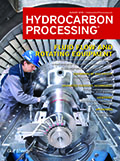
Special Focus: Fluid flow and rotating equipment
To mitigate leakage, mechanical seals are one of the most critical components for centrifugal pumps.
Increasing competitive pressures in process industries, including oil and gas, are driving dramatic changes in the operational needs of process plants, utilities and pipelines.
Pressure relief valves (PRVs) protect equipment from excessive overpressure and, in case of emergency situations, they should ensure a sufficient discharge of mass to reduce the pressure below the recommended pressure limits.
Process Optimization
A debutanizer column was experiencing unstable operation, with frequent pressure swings and product composition fluctuations from the column overheads system.
Hydrocarbon Processing Awards
<i>Hydrocarbon Processing</i>, the downstream processing sector’s leading technical publication, has announced the finalists for its second annual awards.
Process Control and Instrumentation
Raw wellhead natural gas is a complex mixture of methane (CH<sub>4</sub>), hydrocarbon condensates, natural gas liquids (NGL), water, contaminants, hydrogen sulfide (H<sub>2</sub>S), carbon dioxide (CO<sub>2</sub>), nitrogen, mercury and other compounds.
Oil refineries provide a smorgasbord of challenging applications for instrumentation engineers and technicians.
Environment and Safety
Overall energy management and operational conservation have become crucial factors for profitability in today’s refining segment.
Maintenance and Reliability
The industrial manufacturing sector is grappling with an unprecedented number of challenges.
Water Management
Refiners are becoming increasingly dependent on opportunity crudes to stay competitive and enhance margins in the industry’s present uncertain state.
Wastewater treatment units (WWTUs) in petroleum refineries are designed to meet effluent limitations incorporated into National Pollutant Discharge Elimination System (NPDES) permits for “conventional pollutants.”
Columns
At the end of this month, <i>Hydrocarbon Processing</i> will honor the latest technological advances in the hydrocarbon processing industry (HPI) at an awards gala.
In mid-2017, we received a well-written request from a young reliability engineer.
Hydrotesting is performed on piping and vessels to verify their integrity.
If chemical companies want to remain competitive and move forward in a changing world, they must rapidly adopt innovative technologies.
The 2017 process instrumentation and automation (PI&A) market in the US, valued at $13.4 B, is projected to grow 3.7% by 2022 to a total of $16 B.
As the world’s population increases and living standards continue to improve, the demand for energy and chemicals is stronger than ever before.
Trends & Resources
From September 25–26, Hydrocarbon Processing will bring its International Refining and Petrochemical Conference (IRPC) back to the US.
Refining is the process of separating crude oil into different hydrocarbon groups through distillation.
With the exception of fuel oil, US product markets showed losses against pressure from across the barrel and high crude oil prices.
According to <i>Hydrocarbon Processing</i>’s Construction Boxscore Database, nearly 150 new projects have been announced in the downstream processing industries this year.
Carboline has released Carboquick® 200, a high-build, one-coat, quick-drying polyaspartic coating that can be applied directly to metal.
Elliott Group has appointed Mark Babyak as VP of its cryodynamic products business, formerly the cryodynamics division of Ebara Intl. Corp.

- SkyNRG starts construction on its first SAF plant in Delfzijl, the Netherlands 2/13
- India's Reliance wins U.S. license for Venezuelan oil 2/13
- Singapore light distillates stocks hit over 3-yr high on robust imports 2/13
- Three contractors injured at ExxonMobil facility in Beaumont, Texas (U.S.) 2/13
- China's epic renewables boom lifts it into rare clean capacity club 2/13
- TotalEnergies booked loss in France due to refining activities, CEO says 2/13




